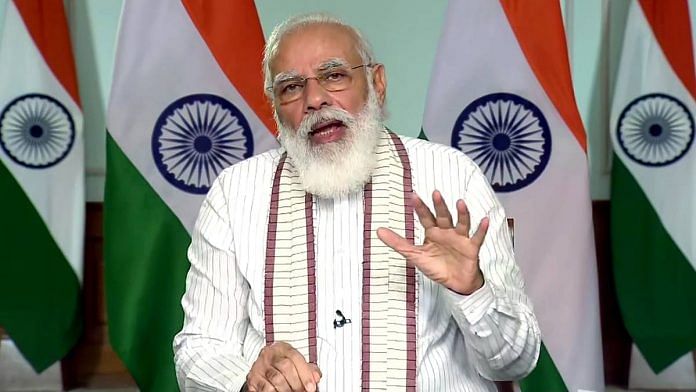New Delhi: Asserting that future will be shaped by societies that invest in science and innovation, Prime Minister Narendra Modi on Monday cited India’s handling of COVID-19 to state that the country’s scientific institutions are its “greatest assets” and have done “wonders” in tackling the disease.
In his virtual keynote address at the Grand Challenges Annual Meeting, Modi said India is now at the forefront of vaccine development for COVID-19 and that some of the vaccine candidates are in advanced stages of the trial.
With India’s experience and research talent, the country will be at “the centre of global healthcare effort” and will want to help other nations, he said, noting that more than 60 per cent of vaccines used for global immunisation programmes are produced here.
India has proven capacity for producing quality medicines and vaccine at low cost, he said.
Speaking of the country’s efforts for immunisation of its citizens against COVID-19, he said India is already working on putting a robust vaccine delivery system in place and its digitized network, along with the new digital health ID, will be used to ensure its success.
“Today, we are seeing a decline in the number of daily cases and the growth rate of cases. India has one of the highest recovery rates of 88 per cent,” Modi said.
“In India, we have a strong and vibrant scientific community. We also have very good scientific institutions. They have been India’s greatest assets, especially during the last several few months, while fighting COVID-19. From containment to capacity building, they have achieved wonders,” he added.
India was one of the first countries to adopt a flexible lockdown when there were only a few hundreds of total cases and also was one of the first to encourage the use of face masks, he noted.
India actively began to work on effective contact-tracing and was one of the earliest to deploy the rapid antigen tests, he said.
While stressing that future will be shaped by societies that invest in science and innovation, the prime minister cautioned that this cannot be done in a short-sighted manner and one has to invest in science and innovation well in advance.
That is when we can reap benefits at the right time, he said.
Also read: India seeing decline in Covid infection rate, recovery rate at 88%, says PM Modi
“The journey to these innovations must be shaped by collaboration and public participation. Science will never prosper in silos,” he said, praising the Grand Challenges programme for understanding this ethos well.
Modi said India’s size, scale and diversity have always made the global community “curious”, as he pointed out that its population is almost four times of the USA’s and many of its states are as populated as many nations in Europe and Asia.
“Thanks to people-powered and people-driven approach, India has kept its COVID-19 date rate very low,” he said.
It has taken a global pandemic to make us realise yet again the importance of teamwork, he said and highlighted that apart from COVID-19 several communicable and non-communicable have also been impacting people.
“We have made many interventions which are contributing to a better healthcare system. Take sanitation. Improved cleanliness. More toilet coverage. Who does this help the most? It helps the poor and underprivileged. It leads to a reduction in diseases,” he said.
The country is also running the world’s largest health insurance scheme, he added.
The 2020 summit, being convened virtually from October 19-21, brings together policymakers and scientific leaders, calling for deepened scientific collaborations in solving global health problems, with great emphasis on COVID-19 with an “India for the World” framing.
The three-day event will feature leaders talks, panel discussions and virtual informal conversations on topics ranging from scientific interventions for fighting the pandemic, managing the pandemic and accelerating the development and implementation of global solutions to combat this pandemic and prevent the next one. Approximately 1600 people from 40 countries are participating in this meeting.
It is being co-hosted by the Bill & Melinda Gates Foundation, Department of Biotechnology, Ministry of Science and Technology, Government of India, the Indian Council of Medical Research and NITI Aayog, along with the Grand Challenges Canada, the United States Agency for International Development and Wellcome.
Grand Challenges India was set up as a partnership of the Department of Biotechnology, Government of India and the Bill & Melinda Gates Foundation in 2012, and Wellcome also joined the partnership. Grand Challenges India works across a range of health and developmental priorities ranging from agriculture, nutrition, sanitation, maternal and child health to infectious diseases.
Also read: Digital health ID can get Indian economy moving again, NHA chief Indu Bhushan hopes



